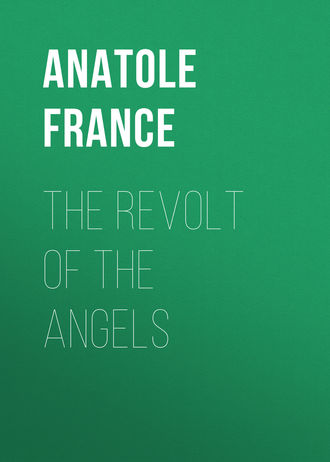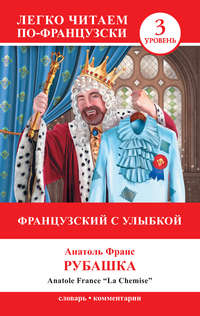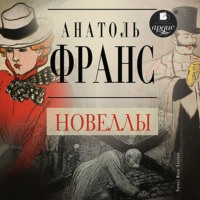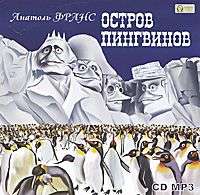 полная версия
полная версияThe Revolt of the Angels
When the coffee was served, Prince Istar, Zita, Arcade, and the Japanese angel took it in turns to give an account of the forces assembled against Ialdabaoth. Angels, in exchanging eternal bliss for the sufferings of an earthly life, grow in intelligence, acquire the means of going astray and the faculty of self-contradiction. Consequently their meetings, like those of men, are tumultuous and confused. Did one of them deal in figures, the others immediately called them in question. They could not add one number to another without quarrelling, and arithmetic itself, subjected to passion, lost its certitude. The Kerûb, who had brought with him the pious Théophile, waxed indignant when he heard the musician praising the Lord, and rained down such blows on his head as would have felled an ox. But the head of a musician is harder than a bucranium, and the blows which Théophile received did not avail to modify that angel's notion of divine providence. Arcade, having at great length set up his scientific idealism in opposition to Zita's pragmatism, the beautiful archangel told him that he argued badly.
"And you are surprised at that!" exclaimed young Maurice's guardian angel. "I argue, like you, in the language of human beings. And what is human language but the cry of the beasts of the forests or the mountains, complicated and corrupted by arrogant anthropoids. How then, Zita, can one be expected to argue well with a collection of angry or plaintive sounds like that? Angels do not reason at all; men, being superior to the angels, reason imperfectly. I will not mention the professors who think to define the absolute with the aid of cries that they have inherited from the pithecanthropoid monkeys, marsupials, and reptiles, their ancestors! It is a colossal joke! How it would amuse the demiurge, if he had any brains!"
It was a beautiful starlight night. The gardener was silent.
"Nectaire," said the beautiful archangel, "play to us on your flute, if you are not afraid that the Earth and Heaven will be stirred to their depths thereby."
Nectaire took up his flute. Young Maurice lighted a cigarette. The flame burnt brightly for a moment, casting back the sky and its stars into the shadows, and then died out. And Nectaire sang of the flame on his divine flute. The silvery voice soared aloft and sang:
"That flame was a whole universe which fulfilled its destiny in less than a minute. Suns and planets were formed therein. Venus Urania apportioned the orbits of the wandering spheres in those infinite spaces. Beneath the breath of Eros – the first of the gods, – plants, animals, and thoughts sprang into being. In the twenty seconds which hurried by betwixt the life and death of those worlds, civilizations were unfolded, and empires sank in long decline. Mothers shed tears, and songs of love, cries of hatred, and sighs of victims rose upward to the silent skies.
"In proportion to its minuteness, that universe lasted as long as this one – whereof we see a few atoms glittering above our heads – has lasted or will last. They are, one no less than the other, but a gleam in the Infinite."
As the clear, pure notes welled up into the charmed air, the earth melted into a soft mist, the stars revolved rapidly in their orbits, the Great Bear fell asunder, its parts flew far and wide. Orion's belt was shattered; the Pole Star forsook its magnetic axis. Sirius, whose incandescent flame had lit up the far horizon, grew blue, then red, flickered, and suddenly died out. The shaken constellations formed new signs which were extinguished in their turn. By its incantations the magic flute had compressed into one brief moment the life and the movement of this universe which seems unchanging and eternal both to men and angels. It ceased, and the heavens resumed their immemorial aspect. Nectaire had vanished. Clodomir asked his guests if they were pleased with the cabbage soup which, in order that it might be strong, had been kept simmering for twenty-four hours on the fire, and he sang the praises of the Beaujolais which they had drunk.
The night was mild. Arcade, accompanied by his guardian angel, Théophile, Prince Istar, and the Japanese angel, escorted Zita home.
CHAPTER XXXIII
HOW A DREADFUL CRIME PLUNGES PARIS INTO A STATE OF TERROR
THE city was asleep. Their footsteps rang loudly on the deserted pavement. Having reached the corner of the Rue Feutrier, half-way up Montmartre, the little company halted before the dwelling of the beautiful angel. Arcade was talking about the Thrones and Dominations with Zita, who, her finger on the bell, could not make up her mind to ring. Prince Istar was tracing the mechanism of a new sort of bomb on the pavement with the end of his stick, and bellowed so loudly that he woke the sleeping citizens and stirred into activity the amatory passions of the neighbouring Pasiphaës. Théophile was singing the barcarole from the second act of Aline, Queen of Golconda at the top of his voice. Maurice, his arm in a sling, was fencing left-handed with the Japanese, striking sparks from the pavement, and crying "A hit! a hit!" in a piercing voice.
Meanwhile Inspector Grolle at the corner of the next street was dreaming. He had the bearing of a Roman legionary and displayed all the characteristics of that proudly servile race, who, ever since men first took to building cities, have been the mainstay of Empires and the support of ruling houses. Inspector Grolle was very strong, but very tired. He suffered from an arduous profession and from lack of food. He was a man devoted to duty, but still a man, and he was unable to resist the wiles, the charms, and the blandishments of the gay ladies whom he met in swarms in the shadows along the empty streets and round about pieces of waste ground; he loved them. He loved like a soldier under arms. It tired him, but courage conquered fatigue. Though he had not yet reached the middle of Life's way, he longed for sweet repose and peaceful country pursuits. At the corner of the Rue Muller, on this mild night, he stood lost in thought. He was dreaming of the house where he was born, of the little olive wood, of his father's bit of ground, of his old mother, bent with long and heavy labour, whom he would never see again. Roused from his reverie by the nocturnal tumult, Inspector Grolle turned the corner of the street, and looked rather unfavourably at the band of loiterers, wherein his social instinct suspected enemies of law and order. He was patient and resolute. After a lengthy silence, he said, with awe-inspiring calm:
"Move on, there!"
But Maurice and the Japanese angel were fencing and heard nothing. The musician heard nothing but his own melodies. Prince Istar was absorbed in the explanation of explosive formulæ. Zita was discussing with Arcade the greatest enterprise that had ever been conceived since the solar system issued from its original nebula, – and thus they all remained unconscious of their surroundings.
"Move on, I tell you!" repeated Inspector Grolle.
This time the angels heard the solemn word of warning, but either through indifference or contempt, they neglected to obey, and continued their talk, their songs, and their cries.
"So you want to be taken up, do you?" shouted Inspector Grolle, clapping his great hand on Prince Istar's shoulder.
The Kerûb was indignant at this vile contact, and with one blow from his formidable fist sent the Inspector flying into the gutter. But Constable Fesandet was already running to his comrade's aid, and they both fell upon the Prince, whom they belaboured with mechanic fury, and whom, notwithstanding his strength and weight, they would perchance have dragged all bleeding to the police station, had not the Japanese angel overset them one after the other without effort, and reduced them to writhing and shrieking in the mud, before Maurice, Arcade, and Zita had time to intervene. As to the angelic musician, he stood apart trembling, and invoked the heavens.
At this moment two bakers who were kneading their dough in a neighbouring cellar ran out at the noise, in their white aprons, stripped to the waist. With an instinctive feeling for social solidarity they took the side of the downfallen police. Théophile conceived a just fear at the sight of them, and fled away; they caught him and were about to hand him over to the guardians of the peace, when Arcade and Zita tore him from their hands. The fight continued, unequal and terrible, between the two angels and the two bakers. Like an athlete of Lysippus in strength and beauty, Arcade smothered his heavy adversary in his arms. The beautiful archangel drove her dagger into the baker who had attacked her. A dark stream of blood flowed down over his hairy chest, and the two white-capped supporters of the law sank to the ground.
Constable Fesandet had fainted face downwards in the gutter. But Inspector Grolle, who had got up, blew a blast on his whistle loud enough to be heard at the neighbouring police-station, and sprang upon young Maurice, who, having but one arm with which to defend himself, fired his revolver with his left hand at the inspector, who put his hand to his heart, staggered, and dropped down. He gave a long sigh, and the shadows of eternity darkened his eyes.
Meanwhile, windows opened one by one, and heads looked out on the street. A sound of heavy steps approached. Two policemen on bicycles debouched upon the street. Thereupon Prince Istar flung a bomb which shook the ground, put out the gas, shattered some of the houses, and enveloped the flight of young Maurice and the angels in a dense smoke.
Arcade and Maurice came to the conclusion that the safest thing to do after this adventure was to return to the little flat in the Rue de Rome. They would certainly not be sought for immediately and probably not at all, the bomb thrown by the Kerûb having fortunately wiped out all witnesses of the affair. They fell asleep towards dawn, and they had not yet awoke at ten o'clock in the morning when the concierge brought their tea. While eating his toast and butter and slice of ham, young d'Esparvieu remarked to the angel:
"I used to think that a murder was something very extraordinary. Well, I was mistaken. It is the simplest, the most natural action in the world."
"And of most ancient tradition," replied the angel. "For long centuries it was both usual and necessary for man to kill and despoil his fellows. It is still recommended in warfare. It is also honourable to attempt human life in certain definite circumstances, and people approved when you wanted to assassinate me, Maurice, because it appeared to you that I had been intimate with your mistress. But killing a police-inspector is not the action of a man of fashion."
"Be silent," exclaimed Maurice, "be silent, scoundrel! I killed the poor Inspector instinctively, not knowing what I was doing. I am grieved to my heart about it. But it is not I, it is you who are the guilty one; you who are the murderer. It was you who lured me along this path of revolt and violence which leads to the pit. You have been my undoing. You have sacrificed my peace of mind, my happiness, to your pride and your wickedness, and all in vain; for I warn you, Arcade, you will not succeed in what you are undertaking."
The concierge brought in the newspapers. On seeing them Maurice grew pale. They announced the outrage in the Rue de Ramey in huge headlines:
"An Inspector killed – Two cyclist policemen and two bakers seriously wounded – Three houses blown up, numerous victims."
Maurice let the paper drop, and said in a weak, plaintive voice:
"Arcade, why did you not slay me in the little garden at Versailles amidst the roses, to the song of the blackbirds?"
Meanwhile terror reigned in Paris. In the public squares, and in the crowded streets, house-wives, string-bag in hand, grew pale as they listened to the story of the crime, and consigned the perpetrators to the most dreadful punishment. Shop-keepers, standing at the doors of their shops, put it all down to the anarchists, syndicalists, socialists, and radicals, and demanded that special measures should be taken against them.
The more thoughtful people recognized the handiwork of the Jew and the German, and demanded the expulsion of all aliens. Many vaunted the ways of America and advocated lynching. In addition to the printed news sinister rumours became current. Explosions had been heard at various places; everywhere bombs had been discovered; everywhere individuals, taken for malefactors, had been struck down by the popular arm and given up to justice, torn to ribbons. On the Place de la République a drunkard who was crying "Down with the police" was torn to pieces by the crowd.
The President of the Council and Minister of Justice held long conferences with the Prefect of Police, and they agreed to take immediate action. In order to allay the excitement of the Parisians, they arrested five or six hooligans out of the thirty thousand which the Capital contains. The chief of the Russian police, believing he recognised in this attack the methods of the Nihilists, demanded, on behalf of his Government, that a dozen refugees should be given up. The demand was immediately granted. Proceedings were also taken for certain individuals to be extradited to ensure the safety of the King of Spain.
On learning of these energetic measures, Paris breathed once more, and the evening papers congratulated the Government. There was excellent news of the wounded. They were out of danger and identified as their assailants all who were brought before them.
True, Inspector Grolle was dead; but two Sisters of Mercy kept vigil at his side, and the President of the Council came and laid the Cross of Honour on the breast of this victim of duty.
At night there were panics. In the Avenue de la Révolte the police, noticing a travelling acrobat's caravan on a piece of waste ground, took it for the retreat of a band of robbers. They whistled for help, and when they were a goodly number, attacked the caravan. Some worthy citizens joined them; fifteen thousand revolver-shots were fired, the caravan was blown up with dynamite, and among the débris they found the corpse of a monkey.
CHAPTER XXXIV
WHICH CONTAINS AN ACCOUNT OF THE ARREST OF BOUCHOTTE AND MAURICE, OF THE DISASTER WHICH BEFELL THE D'ESPARVIEU LIBRARY, AND OF THE DEPARTURE OF THE ANGELS
MAURICE D'ESPARVIEU passed a terrible night. At the least sound he seized his revolver that he might not fall alive into the hands of justice. When morning came he snatched the newspapers from the hands of the concierge, devoured them greedily, and gave a cry of joy; he had just read that Inspector Grolle having been taken to the Morgue for the post-mortem, the police-surgeons had only discovered bruises and contusions of a very superficial nature, and stated that death had been brought about by the rupture of an aneurism of the aorta.
"You see, Arcade," he exclaimed triumphantly; "you see I am not an assassin. I am innocent. I could never have imagined how extremely agreeable it is to be innocent."
Then he grew thoughtful, and – no unusual phenomenon – reflection dissipated his gaiety.
"I am innocent, – but there is no disguising the fact," he said, shaking his head, "I am one of a band of malefactors. I live with miscreants. You are in your right place there, Arcade, for you are deceitful, cruel, and perverse. But I come of good family and have received an excellent education, and I blush for it."
"I also," said Arcade, "have received an excellent education."
"Where was that?"
"In Heaven."
"No, Arcade, no; you never had any education. If good principles had been inculcated into you, you would still hold them. Such principles are never lost. In my childhood I learnt to revere my family, my country, my religion. I have not forgotten the lesson and I never shall. Do you know what shocks me most in you? It is not your perversity, your cruelty, your black ingratitude; it is not your agnosticism, which may be borne with at a pinch; it is not your scepticism, though it is very much out of date (for since the national awakening there is no longer any scepticism in France); – no, what disgusts me in you is your lack of taste, the bad style of your ideas, the inelegance of your doctrines. You think like an intellectual, you speak like a freethinker, you have theories which reek of radicalism and Combeism and all ignoble systems. Get along with you! you disgust me. Arcade, my old friend, Arcade, my dear angel, Arcade, my beloved child, listen to your guardian angel! Yield to my prayers, renounce your mad ideas; become good, simple, innocent, and happy once more. Put on your hat, come with me to Nôtre-Dame. We will say a prayer and burn a candle together."
Meanwhile public opinion was still active in the matter; the leading papers, the organs of the national awakening, in articles of real elevation and real depth, unravelled the philosophy of this monstrous attack which was revolting to the conscience. They discovered the real origin, the indirect but effective cause in the revolutionary doctrines which had been disseminated unchecked, in the weakening of social ties, the relaxing of moral discipline, in the repeated appeals to every appetite, to every greedy desire. It would be needful, so as to cut down the evil at its root, to repudiate as quickly as possible all such chimeras and Utopias as syndicalism, the income-tax, etc., etc., etc. Many newspapers, and these not the least important, pointed out that the recrudescence of crime was but the natural fruit of impiety and concluded that the salvation of society lay in an unanimous and sincere return to religion. On the Sunday which followed the crime the congregations in the churches were noticed to be unusually large.
Judge Salneuve, who was entrusted with the task of investigation, first examined the persons arrested by the police, and lost his way among attractive but illusory clues; however, the report of the detective Montremain, which was laid before him, put him on the right road, and soon led him to recognise the miscreants of La Jonchère as the authors of the crime of the Rue de Ramey. He ordered a search to be made for Arcade and Zita, and issued a warrant against Prince Istar, on whom the detectives laid hands as he was leaving Bouchotte's, where he had been depositing some bombs of new design. The Kerûb, on learning the detectives' intentions, smiled broadly and asked them if they had a powerful motor-car. On their replying that they had one at the door, he assured them that was all he wanted. Thereupon he felled the two detectives on the stairs, walked up to the waiting car, flung the chauffeur under a motor-'bus which was opportunely passing, and seized the steering wheel under the eyes of the terrified crowd.
That same evening Monsieur Jeancourt, the Police Magistrate, entered Théophile's rooms just when Bouchotte was swallowing a raw egg to clear her voice, for she was to sing her new song, "They haven't got any in Germany," at the "National Eldorado" that evening. The musician was absent. Bouchotte received the Magistrate, and received him with a hauteur which intensified the simplicity of her attire; Bouchotte was en déshabille. The worthy Magistrate seized the score of Aline, Queen of Golconda, and the love-letters which the singer carefully preserved in the drawer of the table by her bed, for she was an orderly young woman. He was about to withdraw when he espied a cupboard, which he opened with a careless air, and found machines capable of blowing up half Paris, and a pair of large white wings, whose nature and use appeared inexplicable to him. Bouchotte was invited to complete her toilette, and, in spite of her cries, was taken off to the police-station.
Monsieur Salneuve was indefatigable. After the examination of the papers seized in Bouchotte's house, and acting on the information of Montremain, he issued a warrant for the arrest of young d'Esparvieu, which was executed on Wednesday, the 27th May, at seven o'clock in the morning, with great discretion. For three days Maurice had neither slept nor eaten, loved nor lived. He had not a moment's doubt as to the nature of the matutinal visit. At the sight of the police magistrate a strange calm fell on him. Arcade had not returned to sleep in the flat. Maurice begged the magistrate to wait for him, dressed with care, and then accompanied the magistrate a calmness of mind which was barely disturbed when the door of the Conciergerie closed on him. Alone in his cell, he climbed upon the table to look out. His tranquillity was due to his weariness of spirit, to his numbed senses, and to the fact that he no longer stood in fear of arrest. His misfortune endowed him with superior wisdom. He felt he had fallen into a state of grace. He did not think too highly or too humbly of himself, but left his cause in the hands of God. With no desire to cover up his faults, which he would not hide even from himself, he addressed himself in mind to Providence, to point out that if he had fallen into disorder and rebellion it was to lead his erring angel back into the straight path. He stretched himself on the couch and slept in peace.
On hearing of the arrest of a music-hall singer and of a young man of fashion, both Paris and the provinces felt painful surprise. Deeply stirred by the tragic accounts which the leading newspapers were bringing out, the general idea was that the sort of people the authorities ought to bring to justice were ferocious anarchists, all reeking and dripping from deeds of blood and arson; but they failed to understand what the world of Art and Fashion should have to do with such things. At this news, which he was one of the last to hear, the President of the Council and Keeper of the Seals started up in his chair. The Sphinxes that adorned it were less terrible than he, and in the throes of his angry meditation he cut the mahogany of his imperial table with his penknife, after the manner of Napoleon. And when Judge Salneuve, whose attendance he had commanded, appeared before him, the President flung his penknife in the grate, as Louis XIV flung his cane out of the window in the presence of Lauzun; and it cost him a supreme effort to master himself and to say in a voice of suppressed fury:
"Are you mad? Surely I said often enough that I meant the plot to be anarchist, anti-social, fundamentally anti-social and anti-governmental, with a shade of syndicalism. I have made it clear enough that I wanted it kept within these lines; and what do you go and make of it?.. The vengeance of anarchists and aspirants to freedom? Whom do you arrest? A singer adored of the nationalist public, and the son of a man highly esteemed in the Catholic party, who receives our bishops and has the entrée to the Vatican; a man who may be one day sent as ambassador to the Pope. At one blow you alienate one hundred and sixty Deputies and forty Senators of the Right on the very eve of a motion to discuss the question of religious pacification; you embroil me with my friends of to-day, with my friends of to-morrow. Was it to find out if you were in the same dilemma as des Aubels that you seized the love-letters of young Maurice d'Esparvieu? I can put your mind at rest on that point. You are, and all Paris knows it. But it is not to avenge your personal affronts that you are on the Bench."
"Monsieur le Garde des Sceaux," murmured the Judge, nearly apoplectic and in a choked voice. "I am an honest man."
"You are a fool … and a provincial. Listen to me; if Maurice d'Esparvieu and Mademoiselle Bouchotte are not released within half an hour I will crush you like a piece of glass. Be off!"
Monsieur René d'Esparvieu went himself to fetch his son from the Conciergerie and took him back to the old house in the Rue Garancière. The return was triumphant. The news had been disseminated that Maurice had with generous imprudence interested himself in an attempt to restore the monarchy, and that Judge Salneuve, the infamous freemason, the tool of Combes and André, had tried to compromise the young man by making him out to be an accomplice of a band of criminals.
That was what Abbé Patouille seemed to think, and he answered for Maurice as for himself. It was known, moreover, that breaking with his father, who had rallied to the support of the Republic, young d'Esparvieu was on the high road to becoming an out-and-out Royalist. The people who had an inside knowledge of things saw in his arrest the vengeance of the Jews. Was not Maurice a notorious anti-Semite? Catholic youths went forth to hurl imprecations at Judge Salneuve under the windows of his residence in the Rue Guénégaud, opposite the Mint.









